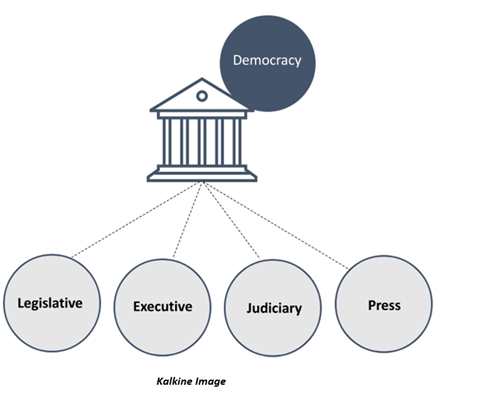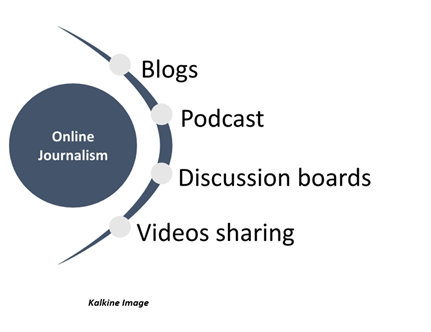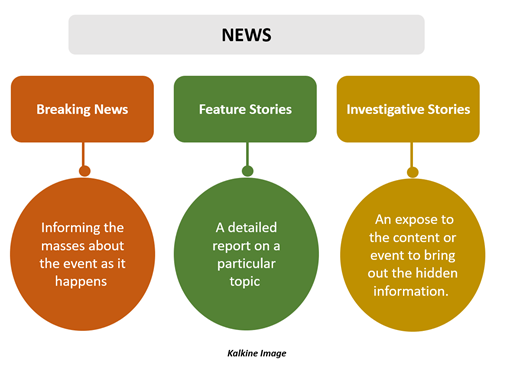Journalism Definition
Updated on 2023-08-29T11:58:25.737649Z
What is Journalism?
Journalism is a profession in which one gathers, accesses, and presents news and trending updates and opinion. It is called the fourth pillar of democracy; the first three are Legislative, Executive and Judiciary.
Journalism is an umbrella term for the act of producing and disseminating news reports. It is a dynamic field. In other words, it is not only of various types but also encompasses several media forms and is forever changing.
There is a famous saying by Walter Lippmann, American writer, reporter and political commentator, which highlights an important aspect of journalism:
‘There can be no higher law in journalism than to tell the truth and to shame the devil.’

What are the Different Mediums of Journalism?
In older times, the act of writing and presenting news was limited to print and non-print mediums. Print mediums included magazines, newspapers and non-print included television and radio.
With ever-evolving technology and advent of internet, journalism has not been limited to print, radio and television, but it has also shifted to digital mediums.
Notably the journalism process is complicated as it starts with gathering the information, assembling it, editing and making it presentable and ultimately presenting it to the viewers or readers in a fastest possible way. Its all about covering and presenting what’s trending, what’s interesting to the readers, and tapping the right medium depending on target audience and journalism expectation.
ALSO READ: Global Digital Titans and Fall-out with Australian Media Companies
Why Has Online Journalism Taken a Front Foot?
The traditional press always gave importance to citizen journalism. Which is nothing but inspiring the masses to participate in the news or information telling process.
With the rise of the internet, online journalism has paved its path to be the most crucial medium of the press. As masses have easy access to digital platforms, they can independently voice out opinions or publish information, without the help of any publication.

Online Journalism consist of similar sections like print or non-print media. Apart from that, online journalism also has new age mediums such as:
- Blogs: These are articles in the form of online diaries kept by individuals or companies. These include the views and opinions of the writers.
- Podcast: These include audio programs which contain information and have views and opinions of the podcast host and attendee.
- Discussion boards: These are online platforms which offer a group of people an opportunity to discuss and exchange views, opinions and information
- Videos sharing: This platform is turning out to be essential, and it is said that the future of the press is video. Videos are created and shared on various platforms which contain views, opinions, graphics and information and much more.
ALSO READ: PointsBet Enters into Exclusive Media Partnership with US Media Giant NBCUniversal, Share Price Skyrockets 56.4%
What are the Various Forms of Journalism?
NEWS: This journalism segment includes gathering and presenting the information and facts as it is.
The journalist is responsible for presenting news in a meaningful and honest way. When delivering a report, a journalist has to offer it the way it is, without giving his/her opinions or involving personal feelings. The hard news consists of news related to politics and public affairs, whereas soft news represents human interest stories and celebrity stories. Apart from these essential sections, there are other genres such as business, sports, medicine, weather, science, education and much more.

The entire news report revolves around the 5 W's and the H.
- Who - who is involved, benefited, affected, harmed?
- What - what is the topic, what does it involve, what is it similar/ different from, what might be affected/ changed by the topic?
- When - when does/did/will/should this take place?
- Where - where does/did/will/should this take place? Does it matter where it takes place? Is it affected by location?
- Why – why is this topic important, why does it matter, do certain things happen (What are some causes and effects within the subject)?
- How - How does this topic work, function, how does it do what it does, how did it come to be, how are those involved affected?
OPINION: This category involves a different style and purpose of presenting information.

- Editorials: These include articles that express publication’s opinion through its senior editorial staff or the publisher. These articles are often unsigned and appear in the opinion section of the print media.
- Op-Ed: These represent short form of opposite editorial and are commonly called guest columns. These articles are submitted to the publications and are often written by members of the community, not publication’s employees.
- Columns: These articles can be a part of Op-Ed, which are signed articles written by independent writers and mainly consist of their own opinions or stories. Publications do not represent these opinions as to their own; they are solely of writers.
- Reviews: This section provides reviews of movies, restaurants, musical concerts, drama etc. and are often written by publication employees or a special guest.
How Can We Trace the History and Evolution of Journalism?
- A reference to the process of gathering, organising, and distribution of information to the masses go back to Rome circa 59 B.C. A circular called Acta Diurna was daily published and hung strategically for the masses to read data.
- Another reference came from Asia where Tang dynasty in China around 618 A.D. to 907 A.D. period issued a court report named Bao. The purpose of this circular was to keep the government officials informed on the relevant events.
- However, the first regular news publication has its roots in Germany as the newspaper published in the English language in 1609.
- It should come as no surprise that during earlier days, the role of journalism was only on reporting government affairs but slowly it started to change and the role reversed as it became a powerful platform to present the truth and question authorities in power.
- Slowly, the freedom of the press became essential in order to publicize the news and information honestly.
- The first journalist foundation came into existence in 1883 in England.
- The American Newspaper Guild was created in 1933 as a trade union for the people working in the news industry.
- Print, radio and television were the trusted medium of information for the masses throughout the world.
- Though many authoritative regimes still do not have freedom of the press in their countries.
- Now in the modern world with a rise of electronic and digital mediums, the print media has taken a hit in readership.
- However, even as the world is ever-changing, the need for the free and honest press is always there, be it in the form of print or non-print mediums.
ALSO READ: Australian News Media to Negotiate with Google And Facebook Post Adoption of Draft Mandatory Code